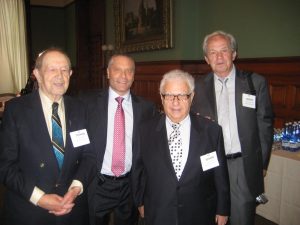Australian filmmaker Philippe Mora was visiting the town of Wroclaw, Poland, for a film festival when his mother, Mirka, told him that his paternal grandparents had gotten married in the town.
On a trip to the local archive, Mora found many documents related to his father’s family, the Morawskis. He also observed an unusual term next to the names of his relatives: “Evacuated.”
“The Nazis had many words,” Mora told The CJN, on the phone from Los Angeles. “Their favourite euphemism was ‘evacuated,’ which meant Auschwitz.”
The word was next to the names of eight family members Mora never knew. The filmmaker then left the town to visit the place where many of his family had met their fate.
“I was stunned by the size of it,” he said of Auschwitz-Birkenau. “It was a clear day, and on a clear day, you couldn’t see the end of it. The size of the operation was mind-bending to me.”
It was the first time the director and World War II history buff had been to Auschwitz – but it wouldn’t be the last.
Mora’s new documentary, Three Days in Auschwitz, is a personal investigation into his family’s past, and it examines how their loss and survival has affected him.
It features exclusive interviews with Mirka, who missed the transport to Auschwitz by one day, as well as many to-the-camera asides from the director, as he ponders the reason for making another film about the Holocaust.
The documentary also contains many of Mora’s paintings that are expressions of the Holocaust. Several of them were inspired by eyewitness accounts of the atrocities.
The film is currently available on DVD and some On Demand services in Canada. It may also play in select Canadian theatres later this year.
As a young boy, Mora said, he was curious about his family history, especially when he noticed that his mother spoke with a French accent, and his father, Georges, talked “like Dr. Strangelove.”
“My father, like a lot of survivors… didn’t want to talk,” Mora said. “My mother didn’t want to talk about it because she was still traumatized. One of the reasons they went to Australia was to get away from Europe.”
Eventually, Mora discovered that his father, who did not put much effort into practising Judaism after the war, was a member of the French Resistance. After the war, Georges helped orphans and Jewish children reunite with their families.
By the time Mora went to study in London in the late 1960s, he was very interested in learning about the Third Reich. Soon he would be making films about World War II, including Swastika, which premiered at the Cannes Film Festival and featured colour footage of Adolf Hitler.
Of his latest film, Mora said he didn’t initially want to make a documentary about Auschwitz, even though he took a film camera with him to the camps.
“In a way, the camera was kind of an emotional defence for me,” he said. “Then, I went back… Only on the third visit did I think, Well, maybe I’ve got enough footage to make a journalistic film.”
Mora’s aim in recording so much of his experience of Auschwitz is to prompt more investigation into the Holocaust.
“Auschwitz, to me, is ground zero in genocide. If we don’t figure out what, exactly happened, we’re not going to be able to figure out all these other genocides.”
 The subtitle for Three Days in Auschwitz is “Cinematic Notes for my Grandchildren.” Since Mora didn’t know that so many of his family were victims of the Holocaust, he insisted that the documentary be made for his descendants.
The subtitle for Three Days in Auschwitz is “Cinematic Notes for my Grandchildren.” Since Mora didn’t know that so many of his family were victims of the Holocaust, he insisted that the documentary be made for his descendants.
But Mora said he had to tackle the material from a personal angle.
“The subject [of the Holocaust] is so big, it would be arrogant to try to cover it all,” he says.
To help the film find wider distribution – not easy for an independently made documentary about the Holocaust – it was useful to have one of Mora’s oldest friends, guitarist Eric Clapton, as the main composer and co-producer.
Clapton’s score, which can only be heard when watching the film and is unavailable for purchase, accompanies the film’s bleak archival images.
“I find the score really moving and unusual,” Mora said. “He combines the tragedy [with] the dignity of survival. It’s such a complex thing he did.






